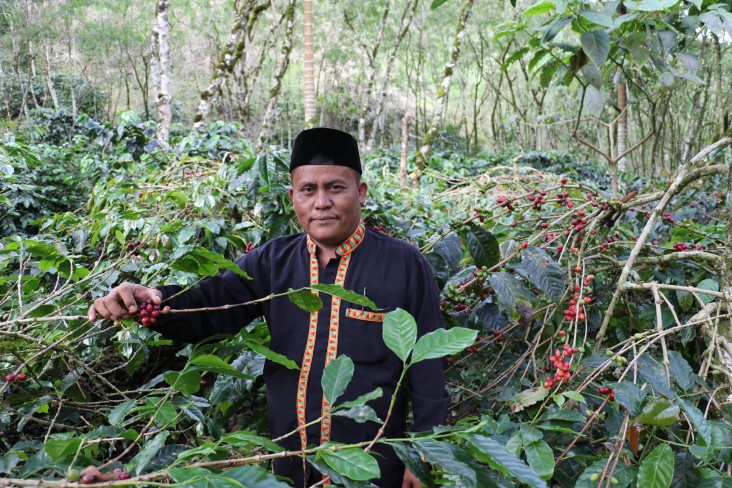Speeches Shim

Teacher, farmer and father Yusdi Abadi knows that his country’s forests are as important to his livelihood as they are worth protecting. “Preserving the environment is the path to a better life for us and for the next generation,” he says. But he didn’t know how to make that future a reality-- and he couldn’t anticipate that coffee would be the answer.
Years ago, he began supplementing his modest teaching salary by farming citronella grass, a hardy essential oil crop grown for use in products like insect repellants. In Mr. Yusdi’s district of Gayo Lues, Aceh, the poverty rate is twice the national average. Many families depend on citronella grass to make a living. But forests have to be cleared to get citronella to grow, and distilling the plants into essential oil requires tremendous amounts of wood.
The pressure that citronella farming put on Aceh’s forests-- the only place on earth where orangutans, rhinos, tigers and elephants still live together in the same ecosystem-- wasn’t sustainable. It was only a matter of time before Gayo Lues residents realized that different farming practices needed to be put into place. Now, farmers, the community and the Gayo Lues government are coming together to make a change.
With help from USAID, through the LESTARI program-- which supports Indonesia to improve sustainable land use and conserve biodiversity-- farmers in the area are turning away from citronella and toward coffee, a more forest-friendly crop that doesn’t rely on clearing land for cultivation or burning wood for processing. The program has also helped farmers develop a coffee nursery, share knowledge about environmentally friendly farming techniques and secure legal access to the land. Over 650 farmers, including Mr. Yusdi, are now making a better living by growing coffee instead of citronella.
All of their efforts protect Aceh’s forests and support the local economy.
“The assistance that the U.S. Government provides through USAID is a perfect illustration of how forest conservation and improved economic livelihoods can co-exist. We are proud to help our partners and local communities ensure that Aceh’s incredible natural resources can benefit current generations-- and generations to come,” said USAID Indonesia Deputy Mission Director Ryan Washburn during a recent visit to Gayo Lues.
To support local farmers’ efforts, USAID has distributed over 50,000 coffee seedlings. By shifting production towards more valuable and sustainable crops, communities are helping the forest thrive. The region’s coffee is even gaining global attention; it was featured at a high-level coffee expo in Seattle in early 2018.
With his new knowledge and resources, Mr. Yusdi is now better prepared to play his part in protecting Aceh’s forests: “[Switching from citronella to coffee] improves our welfare and health, and most importantly, it helps us to preserve the environment,” he said. “We hope to become successful coffee farmers and help our forest to grow back like it used to be before.”
Learn more: https://www.lestari-indonesia.org/
For more, follow @USAIDIndonesia on Facebook(link is external), Exposure(link is external), Twitter(link is external) and Flickr(link is external).
Story by Samantha Martin with contributions from Savira Pramuditha.

Comment
Make a general inquiry or suggest an improvement.